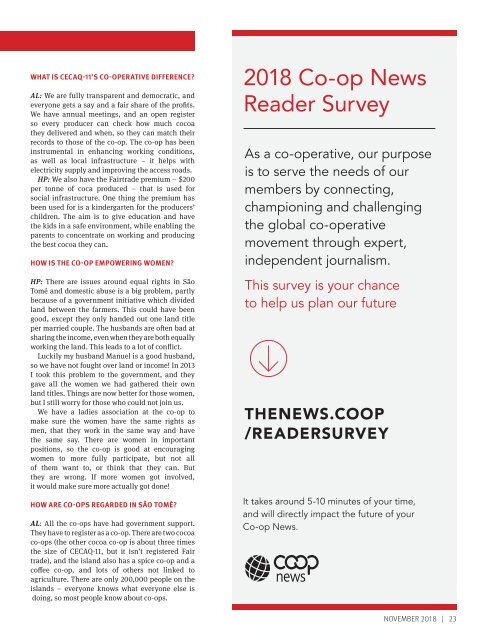NOVEMBER 2018
The November edition of Co-op News looks at co-operation as a remedy - and a safeguard. Plus... how we covered the first world war 100 years ago, reports from co-operative conferences around the world, and our 2018 Christmas gift guide.
The November edition of Co-op News looks at co-operation as a remedy - and a safeguard.
Plus... how we covered the first world war 100 years ago, reports from co-operative conferences around the world, and our 2018 Christmas gift guide.
Create successful ePaper yourself
Turn your PDF publications into a flip-book with our unique Google optimized e-Paper software.
WHAT IS CECAQ-11’S CO-OPERATIVE DIFFERENCE?<br />
AL: We are fully transparent and democratic, and<br />
everyone gets a say and a fair share of the profits.<br />
We have annual meetings, and an open register<br />
so every producer can check how much cocoa<br />
they delivered and when, so they can match their<br />
records to those of the co-op. The co-op has been<br />
instrumental in enhancing working conditions,<br />
as well as local infrastructure – it helps with<br />
electricity supply and improving the access roads.<br />
HP: We also have the Fairtrade premium – $200<br />
per tonne of coca produced – that is used for<br />
social infrastructure. One thing the premium has<br />
been used for is a kindergarten for the producers’<br />
children. The aim is to give education and have<br />
the kids in a safe environment, while enabling the<br />
parents to concentrate on working and producing<br />
the best cocoa they can.<br />
HOW IS THE CO-OP EMPOWERING WOMEN?<br />
HP: There are issues around equal rights in São<br />
Tomé and domestic abuse is a big problem, partly<br />
because of a government initiative which divided<br />
land between the farmers. This could have been<br />
good, except they only handed out one land title<br />
per married couple. The husbands are often bad at<br />
sharing the income, even when they are both equally<br />
working the land. This leads to a lot of conflict.<br />
Luckily my husband Manuel is a good husband,<br />
so we have not fought over land or income! In 2013<br />
I took this problem to the government, and they<br />
gave all the women we had gathered their own<br />
land titles. Things are now better for those women,<br />
but I still worry for those who could not join us.<br />
We have a ladies association at the co-op to<br />
make sure the women have the same rights as<br />
men, that they work in the same way and have<br />
the same say. There are women in important<br />
positions, so the co-op is good at encouraging<br />
women to more fully participate, but not all<br />
of them want to, or think that they can. But<br />
they are wrong. If more women got involved,<br />
it would make sure more actually got done!<br />
HOW ARE CO-OPS REGARDED IN SÃO TOMÉ?<br />
AL: All the co-ops have had government support.<br />
They have to register as a co-op. There are two cocoa<br />
co-ops (the other cocoa co-op is about three times<br />
the size of CECAQ-11, but it isn’t registered Fair<br />
trade), and the island also has a spice co-op and a<br />
coffee co-op, and lots of others not linked to<br />
agriculture. There are only 200,000 people on the<br />
islands – everyone knows what everyone else is<br />
doing, so most people know about co-ops.<br />
<strong>NOVEMBER</strong> <strong>2018</strong> | 23


















